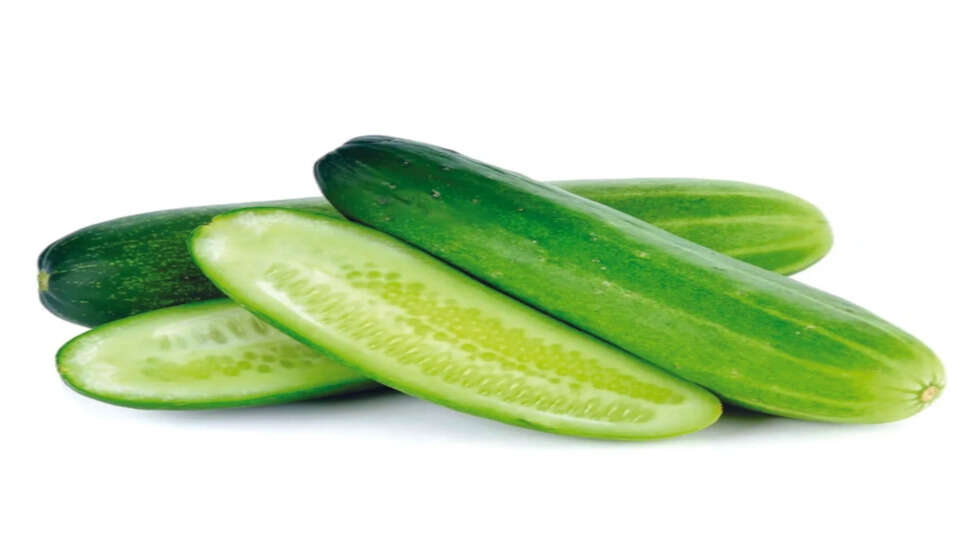Raw, Peeled, or Salted? Here’s What Experts Say About Eating Cucumbers the Right Way

Crisp, refreshing, and widely available, cucumbers are a staple in Indian salads and global health-conscious diets. Yet, despite their simple appearance, cucumbers are often surrounded by a surprising number of food myths and confusion—ranging from how to peel them, when to eat them, and even whether they're "cooling" or "nutritionally empty." So, is there really a right way to eat a cucumber?
To clear the confusion, we turn to expert insights from leading dietitians who say that while cucumbers are indeed one of the most hydrating foods you can eat, there’s no one-size-fits-all rule for consumption. However, knowing how to eat them in a way that maximizes their benefits—and avoids minor pitfalls—can make a difference in your diet.
Cucumber: The Humble Hydrator
Cucumbers are made up of about 95% water, making them an excellent food choice for hydration, especially in hot weather. They’re low in calories, contain a decent amount of fiber, and offer a small but diverse range of nutrients like vitamin K, potassium, magnesium, and antioxidants such as beta-carotene and flavonoids.
According to dietitians, eating cucumbers regularly can support digestion, improve skin health, help regulate blood sugar, and contribute to daily water intake—particularly helpful for people who struggle to drink enough fluids.
Myth 1: Cucumbers Are “Empty” Calories
One of the most common myths surrounding cucumbers is that they offer “no nutrition” or are just “water with a crunch.” While it's true that cucumbers are low in macronutrients like protein and fat, they provide valuable micronutrients and antioxidants—especially when eaten with the peel.
The peel, in particular, contains insoluble fiber and plant compounds that aid digestion and may have anti-inflammatory effects. Many of the antioxidants are also concentrated in the skin, which brings us to the next myth.
Myth 2: Always Peel Your Cucumbers
Peeling cucumbers may remove pesticides or bitterness, but it also removes much of their nutritional content. Dietitians recommend washing them thoroughly under running water or scrubbing them with a vegetable brush to remove dirt and residue instead of peeling.
If you're buying organic or from trusted sources, it's best to eat cucumbers with their peel intact. However, for people with sensitive digestive systems or children who may not tolerate the fibrous skin, peeling is perfectly fine.
Myth 3: Cucumbers Cause Bloating
Some people believe cucumbers cause bloating or indigestion. According to dietitians, this isn’t common for most individuals unless they already have underlying digestive issues or consume cucumbers in very large quantities.
In fact, cucumbers contain compounds like erepsin, an enzyme that helps in breaking down protein and supporting gut health. Their high water and fiber content also support healthy bowel movements.
The key is moderation. Eating a whole bowl of cucumbers at once—especially if your body isn’t used to high fiber—could cause temporary bloating. Gradual inclusion into the diet is always advisable.
Myth 4: Cucumbers Should Not Be Eaten at Night
Ayurvedic and traditional food beliefs in some cultures suggest avoiding raw cucumber or salad at night due to its “cooling” nature, which is thought to disrupt digestion. While this is a cultural view with merit in certain contexts, modern nutrition doesn’t universally discourage eating cucumbers at night.
If you experience coldness, loose stools, or digestive sluggishness after eating cucumbers late in the evening, it may be wise to shift their consumption to earlier in the day. But otherwise, they are safe to eat at any time—especially as a light, low-calorie snack.
Best Ways to Eat Cucumber for Maximum Benefits
While there’s no wrong way to eat a cucumber, there are a few ways to get the most out of this humble vegetable:
1. Eat It Raw, With Skin
Sliced or chopped into salads, dipped into hummus, or added to sandwiches—raw cucumber is the best form to preserve its water content and nutrients.
2. Add a Pinch of Salt (But Don’t Overdo It)
Some people add salt to draw out bitterness or enhance the flavor. While that’s fine occasionally, dietitians warn against heavy salting, especially for those monitoring their sodium intake.
3. Pair with Protein or Fat
Cucumbers are low in calories and may not keep you full for long. Pairing them with protein-rich foods (like paneer or hummus) or healthy fats (like avocado or olive oil) makes for a more balanced snack.
4. Use in Detox Water
Cucumber slices in water make a refreshing drink, often used in detox routines. While the “detox” label is a bit exaggerated, it does encourage hydration and adds a subtle flavor boost.
5. Incorporate Into Yogurt-Based Dishes
In Indian cuisine, cucumbers are often included in raita—a yogurt-based side dish that cools the digestive system and complements spicy foods. This pairing is ideal for summer meals.
Who Should Be Cautious?
Though generally safe for most people, cucumbers may need to be consumed with care in the following cases:
-
Individuals on Diuretics or Kidney Conditions: Due to their high water content and potassium, excess cucumber consumption might affect fluid balance in susceptible individuals.
-
People with IBS or Gut Sensitivity: The seeds or skin may irritate some sensitive stomachs.
-
Allergy Risk (Rare): Though uncommon, some people may have oral allergy syndrome triggered by raw cucumbers, especially if allergic to ragweed.
Cucumber Myths on Social Media: Debunked
Social media is often flooded with exaggerated claims about cucumbers—from curing acne overnight to “melting belly fat.” Dietitians emphasize that while cucumbers are healthy, they’re not miracle foods. They work best as part of a varied, balanced diet.
No, cucumber slices won’t magically erase dark circles in a day, and cucumber juice isn’t a substitute for meals. However, as a hydrating, low-calorie food with a mild diuretic effect, they can support skin health and digestion over time.
Final Word: Keep It Simple
In the end, the right way to eat cucumber is simple: clean it, eat it fresh, and enjoy it as part of a balanced diet. There’s no need to obsess over rules or trends. Whether in a salad, as a snack, or blended into a cooling drink, cucumbers are an easy and effective way to stay hydrated, aid digestion, and nourish your body—especially during the long, hot months of summer.
